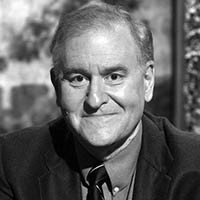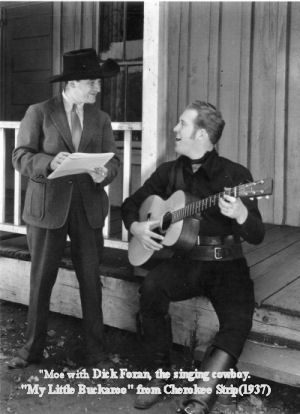 As Summer approaches, we celebrate Irish Month my thoughts turn to my grandfather, M.K. “Moe” Jerome, whom those Warner Brothers called “The Irish Bard.” Moe was a songwriter first on Tin Pan Alley then at Warner Brothers where for some unknown reason he specialized in creating songs for and about the Irish. His first song, written when he was 20, was “Take Me Back To The Ireland that I Love.” It didn’t seem to matter to Moe or the Brothers Warner that he had never visited Ireland and was Jewish.
As Summer approaches, we celebrate Irish Month my thoughts turn to my grandfather, M.K. “Moe” Jerome, whom those Warner Brothers called “The Irish Bard.” Moe was a songwriter first on Tin Pan Alley then at Warner Brothers where for some unknown reason he specialized in creating songs for and about the Irish. His first song, written when he was 20, was “Take Me Back To The Ireland that I Love.” It didn’t seem to matter to Moe or the Brothers Warner that he had never visited Ireland and was Jewish.
When he moved on to Warner Brothers in 1929, the Irish trend continued. Among the many films he worked on were songs for Warner Brothers musicals which Irish audiences would love, such as Shine On Harvest Moon, My Wild Irish Rose and biopics of famous Irishmen like Chauncey Olcott and George M.Cohan. Not forgotten were ordinary men and women such as those in The Irish in Us, The Daughter of Rosie O’ Grady, Three Cheers For the Irish, Tear Gas Squad, and more. Songs had to be historically correct, like the songs the Irish had sung in the 19th and early 20th centuries. For a biography of Olcott, My Wild Irish Rose starring Dennis Morgan, he wrote “Miss Lindy Lou” and borrowed a song written for Minstrel Days, because Olcott got his start wearing blackface. (Olcott later moved away from the Minstrel tradition.)
Minstrel Days originated in a Warner Brothers short made in 1941, plus seven original songs like “Show Me the Way to the Kerry Fair” and “Hushabye Wee Rose of Killarney” recorded by contemporary Irish singers Dennis Day and Dick Haymes. Perhaps my grandfather’s closet friend among the Warner stars was James Cagney. Moe wrote background music and songs for ten of Cagney’s films, including Captains of the Clouds, in which he was asked to write a whistle for Cagney and star Brenda Marshall. But his most celebrated Cagney film was Yankee Doodle Dandy, released in 1942 for which Cagney won his only academy award for playing George M.Cohan. My grandfather played a major role in the making of that film. He taught Cagney how to dance in that stiff leg way that Cohan used. He also wrote two new songs for the film: “All Aboard For Old New York” and “Good Luck Johnny.”
 People who watched the film did not know that the songs were not authentic Cohan songs—until my grandfather revealed the truth. Cagney was so upset that many who worked on the film did not receive screen credit for their work because Cohan refused to allow anyone who did not use Cohan’s own music from being recognized. Six men were in an advertisement which Cagney took out in Variety thanking them for their contributions to the film, including my grandfather and his lyricist partner Jack Scholl.
People who watched the film did not know that the songs were not authentic Cohan songs—until my grandfather revealed the truth. Cagney was so upset that many who worked on the film did not receive screen credit for their work because Cohan refused to allow anyone who did not use Cohan’s own music from being recognized. Six men were in an advertisement which Cagney took out in Variety thanking them for their contributions to the film, including my grandfather and his lyricist partner Jack Scholl.
Irish people were portrayed in movies in diverse ways—as cops, plantation owners and managers, famous coaches like Knute Rockne, entertainers, priests, songwriters and prizefightes and in a variety of other ways.sometimes negatively. So, when you throw a hot dog on the grill this summer let’s toast Moe Jerome (who was Jewish) as Warner Brothers’ Irish bard.
VisitGary Mayonline at garymayauthor.com. The Tunesmith is available through bearmanormedia.com.




















